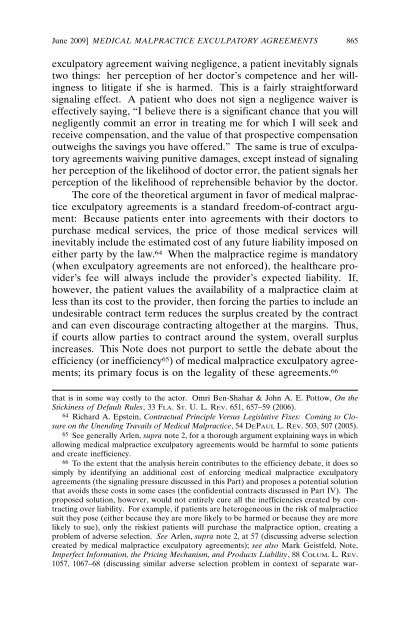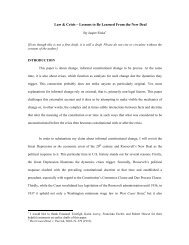In Search of an Enforceable Medical Malpractice Exculpatory
In Search of an Enforceable Medical Malpractice Exculpatory
In Search of an Enforceable Medical Malpractice Exculpatory
Create successful ePaper yourself
Turn your PDF publications into a flip-book with our unique Google optimized e-Paper software.
June 2009] MEDICAL MALPRACTICE EXCULPATORY AGREEMENTS 865<br />
exculpatory agreement waiving negligence, a patient inevitably signals<br />
two things: her perception <strong>of</strong> her doctor’s competence <strong>an</strong>d her willingness<br />
to litigate if she is harmed. This is a fairly straightforward<br />
signaling effect. A patient who does not sign a negligence waiver is<br />
effectively saying, “I believe there is a signific<strong>an</strong>t ch<strong>an</strong>ce that you will<br />
negligently commit <strong>an</strong> error in treating me for which I will seek <strong>an</strong>d<br />
receive compensation, <strong>an</strong>d the value <strong>of</strong> that prospective compensation<br />
outweighs the savings you have <strong>of</strong>fered.” The same is true <strong>of</strong> exculpatory<br />
agreements waiving punitive damages, except instead <strong>of</strong> signaling<br />
her perception <strong>of</strong> the likelihood <strong>of</strong> doctor error, the patient signals her<br />
perception <strong>of</strong> the likelihood <strong>of</strong> reprehensible behavior by the doctor.<br />
The core <strong>of</strong> the theoretical argument in favor <strong>of</strong> medical malpractice<br />
exculpatory agreements is a st<strong>an</strong>dard freedom-<strong>of</strong>-contract argument:<br />
Because patients enter into agreements with their doctors to<br />
purchase medical services, the price <strong>of</strong> those medical services will<br />
inevitably include the estimated cost <strong>of</strong> <strong>an</strong>y future liability imposed on<br />
either party by the law. 64 When the malpractice regime is m<strong>an</strong>datory<br />
(when exculpatory agreements are not enforced), the healthcare provider’s<br />
fee will always include the provider’s expected liability. If,<br />
however, the patient values the availability <strong>of</strong> a malpractice claim at<br />
less th<strong>an</strong> its cost to the provider, then forcing the parties to include <strong>an</strong><br />
undesirable contract term reduces the surplus created by the contract<br />
<strong>an</strong>d c<strong>an</strong> even discourage contracting altogether at the margins. Thus,<br />
if courts allow parties to contract around the system, overall surplus<br />
increases. This Note does not purport to settle the debate about the<br />
efficiency (or inefficiency 65 ) <strong>of</strong> medical malpractice exculpatory agreements;<br />
its primary focus is on the legality <strong>of</strong> these agreements. 66<br />
that is in some way costly to the actor. Omri Ben-Shahar & John A. E. Pottow, On the<br />
Stickiness <strong>of</strong> Default Rules, 33 FLA. ST. U. L. REV. 651, 657–59 (2006).<br />
64 Richard A. Epstein, Contractual Principle Versus Legislative Fixes: Coming to Closure<br />
on the Unending Travails <strong>of</strong> <strong>Medical</strong> <strong>Malpractice</strong>, 54 DEPAUL L. REV. 503, 507 (2005).<br />
65 See generally Arlen, supra note 2, for a thorough argument explaining ways in which<br />
allowing medical malpractice exculpatory agreements would be harmful to some patients<br />
<strong>an</strong>d create inefficiency.<br />
66 To the extent that the <strong>an</strong>alysis herein contributes to the efficiency debate, it does so<br />
simply by identifying <strong>an</strong> additional cost <strong>of</strong> enforcing medical malpractice exculpatory<br />
agreements (the signaling pressure discussed in this Part) <strong>an</strong>d proposes a potential solution<br />
that avoids these costs in some cases (the confidential contracts discussed in Part IV). The<br />
proposed solution, however, would not entirely cure all the inefficiencies created by contracting<br />
over liability. For example, if patients are heterogeneous in the risk <strong>of</strong> malpractice<br />
suit they pose (either because they are more likely to be harmed or because they are more<br />
likely to sue), only the riskiest patients will purchase the malpractice option, creating a<br />
problem <strong>of</strong> adverse selection. See Arlen, supra note 2, at 57 (discussing adverse selection<br />
created by medical malpractice exculpatory agreements); see also Mark Geistfeld, Note,<br />
Imperfect <strong>In</strong>formation, the Pricing Mech<strong>an</strong>ism, <strong>an</strong>d Products Liability, 88 COLUM. L. REV.<br />
1057, 1067–68 (discussing similar adverse selection problem in context <strong>of</strong> separate war-
















